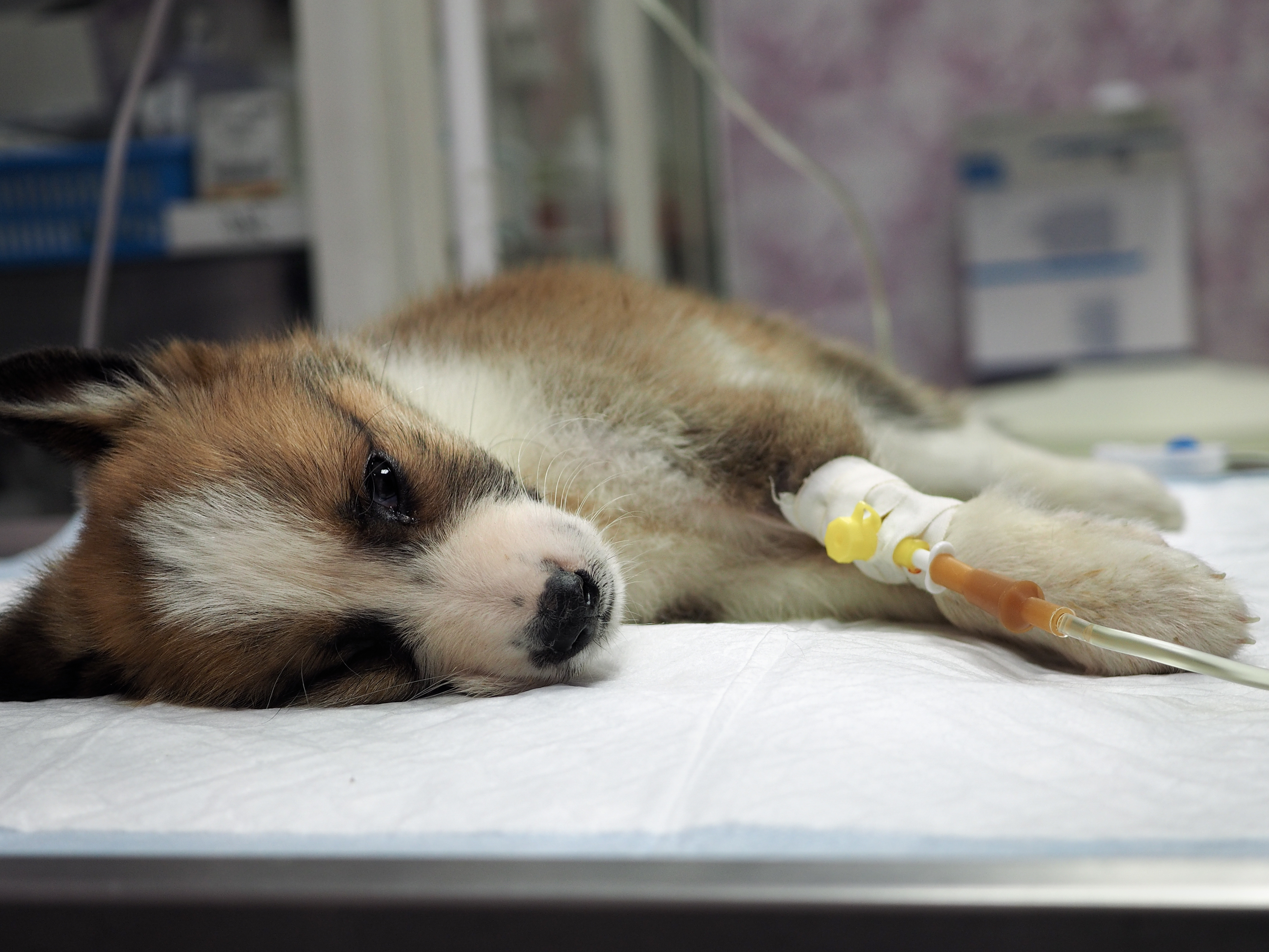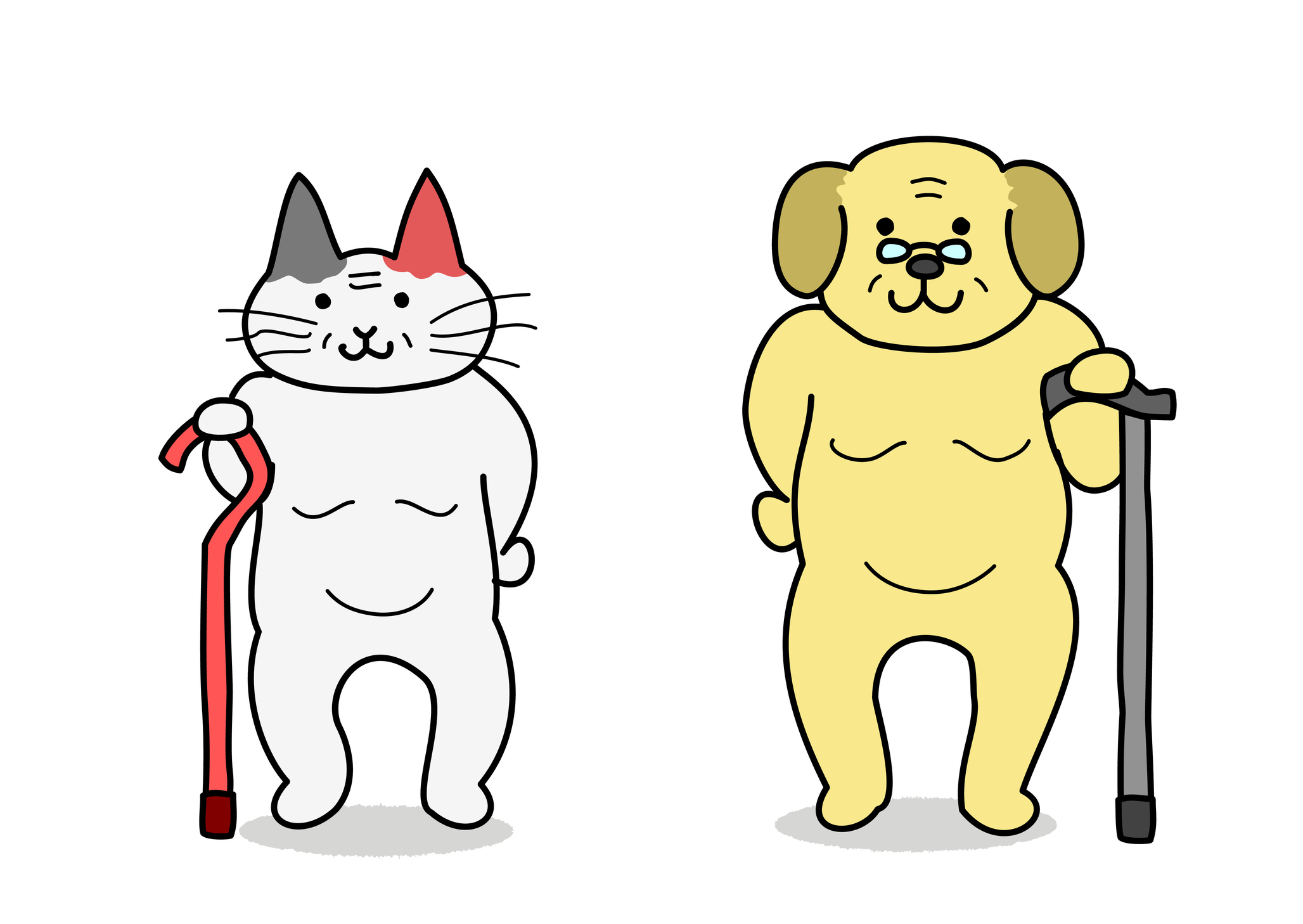
A Vet24 Weight Loss Case Study
A Nutritional Case Study – Case study by Hill’s Nutritional Nurse Consultant Nurse Bianca Martari-Chester, Vet 24 Balcatta, Veterinary Hospital, Western Australia.
Veterinary nurses of today play a vital role in the health of your patients and the success of your practice. There are so many ways to utilize the skills of veterinary nurses, which will in turn increase their job satisfaction. This is apparent in this case study following a patient on a metabolic advanced weight solution diet.
Nutrition in particular, represents a real opportunity for veterinary nurses to take on a higher level of responsibility. Implementing a nurse nutritional assessment protocol as part of your standard of care will not only give your nurses a chance to broaden their skills and responsibilities: you will also be offering a higher level of patient care, which in turn will build stronger relationships with your clients.
The following is a case study from a nurse who carries out successful nutritional consultations in her practice with some fantastic results! Nurses are capable of so much more and here’s a great example!
Nutritional Case Study of Bella
Patient Details:
Patient Name: Bella
Species: Canine
Breed: Chinese Sharpei Mix
Sex: Sterilised female
Age: 7 years 3 months
Weight: 50.2kg
History:
Bella presented to the practice for her annual health check and vaccination. Bella’s owner had no concerns about her at presentation apart from her ongoing weight issues.
Presentation and Examination:
The attending veterinarian obtained a history and performed a physical examination. There were no significant findings other than Bella’s weight. The owners already had Bella on a weight loss diet, however they had not been provided with guidance and/or how to much to feed. The veterinarian discussed the implications of an unhealthy weight and referred the owners to me for a nutrition consultation and development of a feeding plan.
Body Condition/Score:
An appropriate nutritional recommendation depends on an accurate assessment of body condition/score and body fat index. A body score ranging from 1 to 5 is determined by visual analysis and palpation of the pet’s body. In general, this process assesses a patient’s fat stores and, to a lesser extent, muscle mass. Fat cover is evaluated over the ribs, down the topline, around the tail head and ventrally along the abdomen. A score of 1 is considered very thin, 3 is ideal, while 5 is considered obese. The veterinarian had assessed Bella’s body score as 5/5.
Photos of Bella at initial visit: November 2015
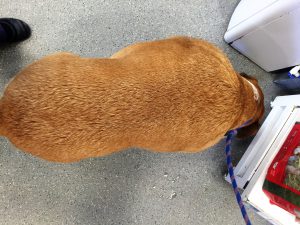

Measurements and Body Fat Index
To determine a healthy weight for Bella zoometric measurements were taken. Zoometric measurements enable an accurate determination of ideal weight and facilitate an objective discussion with the client about the health risks associated with the current weight. They also assist in creating a feeding plan for successful weight loss.
Zoometric measurements are taken by using a tape measure to measure certain parameters on the pet.
Bella’s measurements were as follows:
- Head circumference: 41cm
- Head length: 14cm
- Front leg: 25cm
- Back leg: 13cm
- Current weight: 50.2kg
When Bella’s measurements were entered into the Hills Health Weight Protocol (www.hwp.hillvet.com), her body fat index was determined to be 55-65% (a healthy body fat index is 11-25%) and her ideal body weight was calculated to be 30 kg.
Nutrient Requirements
Prior to making a nutritional recommendation it is important to consider the patient’s life stage and the owner’s life style. The diet recommended needs to contain the correct nutrients in the correct quantities and ratios for the particular pet to ensure it is complete and balanced.
Recommendation
Communicating with clients is especially important when considering the detrimental and long term effects of obesity. Bella’s owners had already recognised that Bella need to lose weight and were committed to a weight loss program, the first step to success. However it is also important that the owners understand that success will not happen overnight.
With an optimal weight of 30kg, Bella needed to lose 20.2 kg. It was explained to the owners that it would take approximately 55 weeks of losing an average of 400 g a week for Bella to attain a normal healthy weight.
The diet recommended for Bella was Hill’s™ Prescription Diet™ Metabolic Advanced Weight Solution.
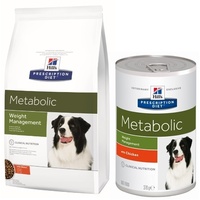
The key benefits of Hills Canine Metabolic Advanced Weight Control are as follows:
|
Proprietary bundle of synergistically effective nutrients |
High |
Provides appetite regulation and improves energy metabolism |
|
Fibre |
High |
Soluble and insoluble fibre to trigger satiety, control appetite and maintain gastrointestinal health. |
|
L-carnitine |
High |
Helps metabolise fat for energy production and maintain lean body mass. |
|
Lysine |
High |
Helps metabolise fat for energy production and maintain a lean body mass. |
|
Antioxidants |
Added |
Defend cells from free radical oxidation, promoting a healthy immune system. |
How much to feed
A pet’s resting energy requirement (RER) is calculated by using the following equation: RER = 70 (Bodyweight)0.75
As Bella’s ideal weight is 30kg, her RER is: RER = 30 x 30 x 30 = Ö Ö x 70 = 897 kcal per day
The daily energy requirement (DER) can then be calculated by multiplying the RER by a factor which depends on the pet’s life stage and lifestage.
|
Canine Factors |
|
|
Neutered adult |
1.6 x RER |
|
Intact adult |
1.8 x RER |
|
Inactive/Obese prone |
1.4 x RER |
|
Weight loss |
1.0 x RER |
Daily energy requirement (kcal/day) = RER x Life stage factor
Daily energy requirement: 897kcal per day x 1 = 897kcal per day
Metabolic Advanced Weight Solution (dry food) contains 255kcal per cup, equivalent to 110 g of food. Given that Bella requires 897kcal per day, she needs to be fed 3.5 cups or 385 g of this food per day. It was recommended that Bella should be fed three times a day (128g each feed).
Transitioning diets
For most pets, changing food has minor consequences, however vomiting, diarrhoea, belching and flatulence can be associated with a sudden change. Bella’s owners were therefore provided with a 7 day plan to transition her on to her new diet.
Day 1-2: 25% new diet and 75% old diet
Day 3-4: 50% new diet and 50% old diet
Day 5-6: 75% new diet and 25% old diet
Day 7: 100% new diet
Progress
Although Bella still has a long way to go to reach her optimal healthy weight she is progressing well, and to date has lost 8.7 kg in “x” months.
Currently Bella’s weight is monitored every fortnight. As the owner lives quite a distance from the practice one fortnight the owner will weigh Bella at home and email her weight through, the second fortnight the owners bring Bella in for weigh in (and cuddle).
The owners are very happy with her progress and have seen a dramatic change in Bella’s energy levels. She now quite happily jumps in the car and into the bath, things she has not done in such a long time.
The initial months of Bella’s weight loss program were quite testing in terms of limiting her exercise due to the warmer months, excess weight on her joints and concerns of her heart/lungs with exercise. Currently Bella is being exercised for 20 minutes twice a day (dawn and dusk), and is now quite happy to chase the ducks and the postman again.
Bella’s monthly weight loss progress can be seen below.
|
Date |
Weight |
Current Weight Loss |
Total Weight Loss |
|
09/11/2015 |
50.2kg |
|
|
|
24/11/2015 |
48.3kg |
-1.9kg |
1.9kg |
|
21/12/2016 |
47.9kg |
-400g |
2.3kg |
|
19/01/2016 |
46.4kg |
-1.5kg |
3.8kg |
|
17/02/2016 |
44.7kg |
-1.7kg |
5.5kg |
|
16/03/2016 |
45.1kg |
+400g |
5.1kg |
|
12/04/2016 |
43.7kg |
-1.4kg |
6.5kg |
|
09/05/2016 |
42.2kg |
-1.5kg |
8.0kg |
|
07/06/2016 |
41.5kg |
-700g |
8.7kg |
Photos of Bella: April 2016 (weight loss of 5.1kg)
You can even see how much happier she is.
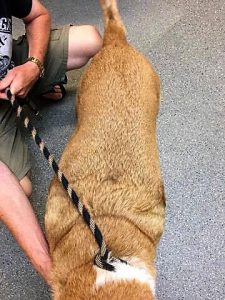
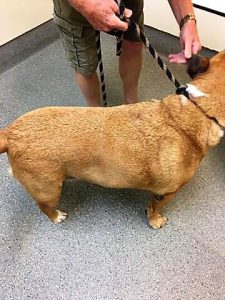
References:
Hills Veterinary Nutritional Advocate, VNA Level 1, “Module 1: Nutrients” – date unknown
Hills Veterinary Nutritional Advocate, VNA Level2, “Module 6: Communicating Therapeutic Nutrition- Weight Management”- date unknown
Hills MyVet website, “Changing to a New Dog food” brochure, http://www.myhillsvet.com.au/en/au/site-search results?search=food+change
Hills Healthy Weight Protocol, “Hill‟s BFI (Body Fat Index) risk chart, http://www.hwp.hillsvet.com/resources/resources.html
Aspinall V. The Complete Textbook of Veterinary Nursing‟, Chapter 10 “Canine and feline nutrition” pages. 191 – 202, Elsevier Limited 2006
McCurnin DM. Clinical Textbook for Veterinary Technicans, “Chapter 26 Companion Animal Clinical Nutrition” pages 653-691, W.B Saunders Company 1998

